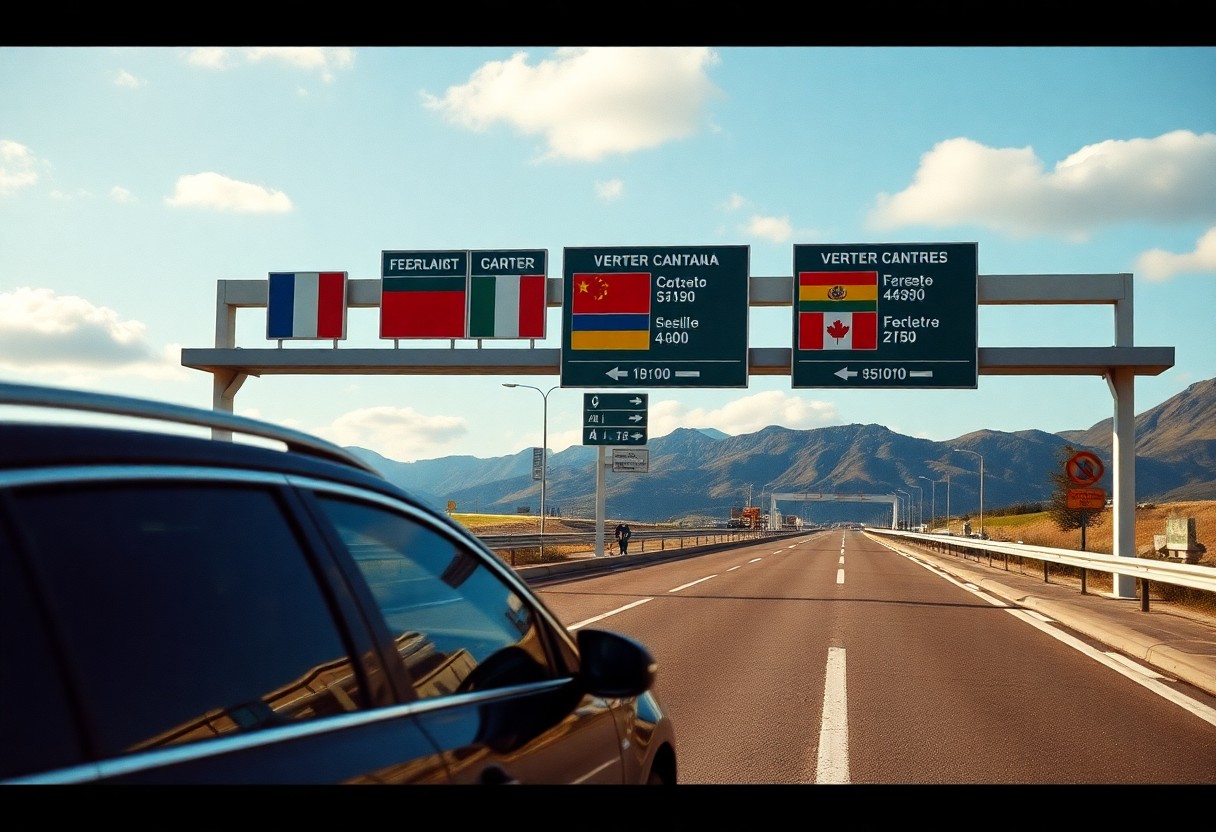Planning your European road trip with a rental car is vital for ensuring a seamless and enjoyable journey. This process encompasses careful route planning and a thorough understanding of cross-border driving regulations that vary significantly between different countries. Rental companies often have distinct policies regarding travel between European nations. While most companies generally allow travel across Western European countries, there are typically stringent restrictions for Eastern European destinations. It’s crucial to meticulously read your rental agreement, as it will detail which borders are permissible to cross and inform you of any additional fees that may be incurred. Before finalizing your reservation, verify that your chosen rental company permits travel to all your intended destinations, as disregarding cross-border regulations could nullify your insurance coverage and lead to significant fines. Gaining clarity on these restrictions is essential for a successful and enjoyable European road trip.
Understand Legal Requirements for Cross-Border Driving in Europe
Before embarking on your European adventure with a rental car, it’s essential to fulfill specific legal obligations and rental requirements. Make sure that your rental agreement explicitly states that cross-border travel is authorized and that you possess sufficient insurance coverage for every country you plan to visit. Many rental companies impose restrictions based on designated European regions, and these regulations can be even more stringent for luxury vehicles. Therefore, it is vital to familiarize yourself with these legalities to avoid any complications during your travels and ensure a hassle-free experience on the roads.
Secure Your International Driving Permit (IDP) for Stress-Free Driving in Europe
One of the most critical documents required for driving in Europe is the International Driving Permit (IDP). Obtaining this permit should be at the top of your to-do list and must be arranged in your home country before you start making travel plans. The IDP acts as a complement to your regular driver’s license and is required in many European countries. By acquiring your IDP in advance, you can ensure compliance with local laws, thus making your driving experience across various nations smoother, more enjoyable, and free of unnecessary legal hurdles.
Essential Information on Mileage Policies and General Driving Restrictions
When renting a car in Europe, many rental agencies provide vehicles with unlimited mileage options, an invaluable benefit for travelers planning extensive road trips. However, it’s essential to be aware that border crossing fees may apply, which can vary significantly—typically ranging from €5 to €47.60 per crossing, depending on the rental agency and the countries involved. Moreover, due to insurance protocols and security measures, rental companies often enforce specific restrictions based on vehicle categories. Premium brands such as BMW, Mercedes, and Audi typically face more limited travel zones compared to standard models, highlighting the necessity to declare your travel intentions beforehand to avoid unexpected fees and ensure a smooth journey.

Gain Insights into Cross-Border Policies of Major Rental Companies
When renting a car in Europe, it’s crucial to understand that each rental company has distinct cross-border policies. Major rental firms typically allow travel between Western European nations, but you will find that strict regulations apply for Eastern Europe. These policies can vary dramatically based on the type of vehicle, with luxury cars often subjected to more restrictions compared to standard vehicles. Being aware of these policies in advance will empower you to make informed decisions regarding your rental choices and travel itinerary, ultimately enhancing your travel experience.
Cross-Border Regulations from Avis and Enterprise: What You Need to Know
Avis and Enterprise offer extensive coverage throughout Western Europe. Their vehicles can generally be driven in most EU countries, including popular destinations like France, Germany, and Spain. However, it’s crucial to recognize that both companies impose specific limitations on luxury vehicles, particularly when entering Italy. For instance, Enterprise applies a daily cross-border fee of 5 euros, with a maximum total charge of 50 euros. Familiarizing yourself with these fees will aid in budgeting appropriately for your travel expenses, allowing for a more enjoyable journey without unexpected financial burdens.
Cross-Border Driving Policies of AutoEurope and Hertz: Key Points to Consider
Among the leading rental providers, AutoEurope and Hertz have specific country restrictions that travelers must be aware of. For example, taking their vehicles into Eastern European nations such as Albania, Belarus, or Ukraine is generally prohibited. Additionally, Hertz restricts luxury vehicles and SUVs from entering Italy, while AutoEurope’s policies may vary based on their local partners. Therefore, it is essential to declare your travel plans to your chosen provider before finalizing your rental car. Your rental agreement will outline any applicable cross-border fees, which can differ by company and destination. For instance, Hertz charges 47.60 euros for crossing from Germany to another approved country, and you may need additional insurance coverage for international travel to protect yourself adequately.
Geographical Restrictions to Be Aware Of Before Your Journey
The regulations surrounding cross-border travel with rental cars in Europe can differ significantly based on the rental company and the type of vehicle you select. Your rental agreement will clearly outline which countries you are allowed to visit with your rental car. It is vital to keep your rental agency updated on your planned route, as crossing borders without the necessary permissions can invalidate your insurance and result in substantial financial penalties.
Countries Where You Can Drive Your Rental Car Without Restrictions
Most rental companies permit you to drive freely within Western European countries, including France, Germany, and Spain. Zone 1 countries generally comprise EU member states in Western Europe, providing the most flexibility for your rental car usage. Your rental agreement will specify all the permitted countries based on your vehicle class, ensuring a clear understanding of your travel options and minimizing the risk of complications during your trip.
Identifying Restricted Territories for Rental Cars: What You Should Know
Countries behind the Iron Curtain often impose restrictions on rental cars. Most rental companies explicitly prohibit travel to Eastern European nations, such as Albania, Belarus, Ukraine, and Russia, due to heightened risks and insurance complications. Additionally, luxury vehicles and certain car brands may face further limitations. High-end brands like BMW, Mercedes, and other premium models often have stricter geographical boundaries. If your travel plans include multiple countries, opting for a standard vehicle class is advisable to enhance flexibility and reduce potential fees or insurance complications.
Vehicle-Specific Limitations You Must Consider for Cross-Border Travel
While rental companies may have varying policies, most enforce strict regulations regarding which vehicles can cross borders. Therefore, it is essential to check the specific limitations associated with your chosen vehicle class before making a booking. These restrictions are designed to protect valuable assets and ensure compliance with insurance requirements across varying European territories, ultimately safeguarding both you and the rental company.
Maximize Your Travel Flexibility with Standard Rental Cars
Contrary to common beliefs, standard rental cars offer the highest level of flexibility for cross-border travel. Typically, you can drive standard vehicles in most Western European countries without needing special permits. However, it’s necessary to inform your rental company about your travel intentions and be prepared to pay cross-border fees ranging from 5 to 50 euros, depending on your specific travel circumstances and destinations.
Understanding Luxury Vehicle Restrictions for Cross-Border Travel
Significant limitations apply to high-end vehicles regarding cross-border travel. Luxury cars face notable restrictions on border crossings, with brands like BMW, Mercedes, and Audi often prohibited from entering Eastern European countries or Italy. In general, these luxury vehicles are confined to Zone 1 countries within Western Europe, imposing additional planning requirements for travelers.
Moreover, if you plan to rent luxury vehicles, anticipate higher security deposits and stricter insurance requirements. Rental firms such as Sixt and Enterprise impose limitations on premium brands like Jaguar, Maserati, and Porsche, allowing them only in select Western European countries. For any border crossings, you will require special permission and possibly additional insurance coverage to ensure full protection during your travels.
Smart Budgeting for Border Crossing Expenses to Avoid Surprises
When planning cross-border trips in Europe with a rental car, keeping your budget in mind is crucial. Most rental companies apply extra fees for crossing borders, even within the Schengen Area. It’s essential to inform your rental agency about your intended route and obtain written permission prior to crossing any borders to avoid unexpected costs that could derail your travel plans.
Typical Costs Associated with Border Crossings: What to Expect
Border crossing fees in Europe usually range from €5 to €50, influenced by the rental company and the specific circumstances. For instance, you’ll incur €47.60 with Hertz when crossing from Germany to another approved country, while Enterprise charges €5 per day, with a maximum of 50 euros for trips starting in Germany. Being well-informed about these potential fees will aid in your financial planning during your travels, allowing you to allocate funds more effectively.
Anticipate Potential Additional Charges for a Smoother Experience
At certain borders, you may encounter extra insurance requirements and documentation fees. Your rental agency might charge for special permits, particularly when traveling to Eastern European countries or when using luxury vehicles. Furthermore, be aware of the possibility of higher insurance premiums for specific destinations, especially in Italy or Eastern Europe. Keep in mind that some credit card insurance policies may not cover all European countries, necessitating the purchase of additional coverage from your rental company for peace of mind during your journey.

Guidelines for Seamless Ferry Travel with Your Rental Car
Not all rental companies maintain the same policies regarding ferry travel in Europe. While most agencies do allow ferry crossings, it’s imperative to verify the specific rules related to your rental. Traveling across water borders often necessitates additional documentation and may involve extra fees that you should be prepared for. Furthermore, your insurance coverage might change when traveling by ferry, making it essential to understand these nuances to avoid complications during your travels.
Company-Specific Policies for Ferry Travel: What to Confirm
Among major rental companies, ferry travel policies can vary widely. Avis and Hertz generally permit ferry travel to approved destinations, but it’s essential to confirm any restrictions on destinations beforehand to avoid complications during your trip. Conversely, Enterprise and Sixt may require pre-authorization and additional insurance for ferry crossings, which must be clearly outlined in your rental agreement to prevent misunderstandings that could affect your travel experience.
Critical Considerations for Vehicle Breakdown Coverage During Ferry Travel
Another important factor to consider is vehicle breakdown coverage when traveling by ferry. Most rental companies hold you responsible for vehicle repatriation costs if your car breaks down after a ferry crossing, which can amount to thousands of euros, depending on your location and the type of vehicle rented. This liability extends beyond mechanical failures; if you encounter an accident or if the vehicle becomes inoperable for any reason while on an island, you are liable for the expenses required to return the car to the original rental location. Some rental companies offer additional insurance to cover these costs, but it is crucial to acquire it before your trip to ensure adequate protection and peace of mind.
Final Tips for Enjoying Smooth Cross-Border Driving with Rental Cars
When planning to drive a rental car across European borders, thorough research and a clear understanding of the specific rules set by your rental company are paramount. While you may relish the freedom to cross borders in most European countries, each rental company has its own policies and associated fees that you must be aware of. The type of rental vehicle you select can greatly influence your travel opportunities, with luxury cars often facing more restrictions than standard models. Always verify the countries you are permitted to visit, account for any required border crossing fees, and review ferry travel regulations before your journey. Carefully scrutinizing the rental agreement and obtaining an International Driving Permit will further equip you for a seamless experience. Your proactive planning is essential to avoid complications at border crossings, significantly enhancing your overall enjoyment and adventure.
Frequently Asked Questions About Driving Rental Cars in Europe
Can I drive my rental car to any European country without restrictions?
No, rental companies enforce specific regulations regarding the countries you can visit. Most companies permit travel within Western European nations such as France, Germany, and Spain. However, many impose restrictions on travel to Eastern European countries, including Albania, Belarus, and Ukraine. Luxury vehicles often face stricter limitations. Always review your rental agreement for the permitted countries before attempting any border crossings to avoid complications.
Will I incur extra charges for crossing borders with a rental car in Europe?
Yes, many rental companies impose border crossing fees. For example, Hertz charges 47.60 euros for each border crossing from Germany, while Enterprise charges 5 euros per day (with a maximum of 50 euros) for trips starting in Germany. These fees apply even when traveling within the Schengen Area. It’s essential to inform the rental company about your travel itinerary and settle any applicable fees before crossing borders to prevent unexpected costs.
Is it allowed to take my rental car on a ferry between European countries?
Yes, most rental companies allow ferry travel if your destination country is on their approved list. However, if your vehicle experiences a breakdown while on an island, you will be responsible for the costs associated with returning it to the original rental location. Some companies, like Hertz, offer coverage for ferry travel through their insurance options (CDW, TP, or SuperCover). Always confirm the specific ferry policies outlined in your rental agreement to avoid any unpleasant surprises during your journey.
The Article: Is It Allowed to Drive a Rental Car Across European Borders? appeared first on https://rentacar24.org/
The Article Driving a Rental Car Across European Borders: Is It Allowed? Was Found On https://limitsofstrategy.com

Your insights on planning a European road trip resonate deeply with me, especially the emphasis on understanding cross-border driving regulations. I’ve had my share of adventures across Europe, and I’ve learned the hard way just how crucial it is to familiarize oneself with rental agreement details.
It sounds like you’ve had some memorable experiences on your European adventures. I can totally relate to the importance of understanding those rental agreements—there can be so many hidden details that can catch you off guard. I once rented a car in France and learned about the toll roads and their fees the hard way. I had no idea how common they were until I found myself dodging charges.
It’s interesting how much there is to learn from traveling, isn’t it? I remember a trip where I accidentally ventured into a low-emission zone in one of the cities, and it ended up being a costly lesson in understanding local regulations. Each country has its quirks, and even subtle differences can lead to unexpected challenges.